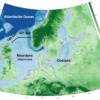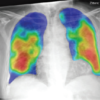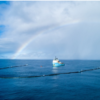Archive

Battle against mercury pollution using fake sponges.
Mercury exists in nature at low concentrations. Normally mercury is not harmful, but due to human emission the quantities become harmful. Researchers at the Zhejiang University (China) have developed a fake sponge that can absorb mercury from the oceans. Where does mercury come from? Long before humans started releasing mercury, there was already mercury present…
Read more
Sacrifice the North Sea to prevent us from drowning?
The beach, the ideal place for a day away. Blowing out in the winter months or a fresh dip in the summer. But for how long can we do that? Global warming is causing sea levels to rise. If we do nothing, a quarter of the Netherlands will be flooded and our coastline will disappear….
Read more
Flip-flops are forever! Or are they not?
The myth of biodegradability Flip-flops are the most popular shoes in the world. Who doesn’t own a pair? But scientists at the University of California in San Diego are now especially excited about a new pair of commercial-quality flip-flops they have created. What is all the fuzz about? The clue lies in the material of…
Read more
Swimming on acid: How ocean acidification affects animal behavior.
Once a very active little fish, Nemo now feels like staying at home more often. He also eats less and does not interact with many other fish. What happened? Ocean Acidification happened. This overlooked aspect of climate change affects many other animals just like Nemo. It is hard to say what will happen to them…
Read more
The dangers of the plastic “virus”
Plastic can be found everywhere these days. Even the oceans are now full of it. However, plastic can also end up in the human body. This is because plastic objects are broken down into tiny particles. Depending on their size, these particles are also referred to as micro- or nanoplastics. They are often so small…
Read more
Algorithms against Covid-19
On May the 8th, 2020, a study was published from Radboud University on the development of a digital system that can identify Covid-19 by viewing X-rays of patients’ lungs. In addition to a diagnosis from a lab, corona is also visible in X-ray scans of the lungs of patients. In many of the cases this…
Read more
Saving the oceans from plastic pollution
When Boyan Slat went diving in Greece during High School holidays in 2010, he saw more plastic than fish. This concerned him and that’s why he invented a device that should be able to remove plastic from the oceans for his High School end project in 2012. In his first year of college, at age…
Read more
Sick on Mars
In 2033 the time has come, at least according to some space organizations, then the first people will set foot on Mars. But the moment the first humans land and settle on the planet, the first problems will also arise, because life on the red planet is not without danger to your health. Sick of…
Read more
Ocean Acidification: Can We See the Future?
Ocean acidification Right now the oceans are acidifying. This has major consequences for the animals that live in the ocean. This also has major consequences for us as humans, a large part of our food comes from the oceans. If less can live in it, some of our food sources will be lost. It is…
Read more
Planetary Plants
Imagine that humans manage to make the long journey to Mars. If they then want to stay there for a longer period of time, they will have to grow food there. Preparing a plate of pasta, for example, requires grain, vegetables and perhaps meat. But on Mars, the composition of the soil and air, the…
Read more
